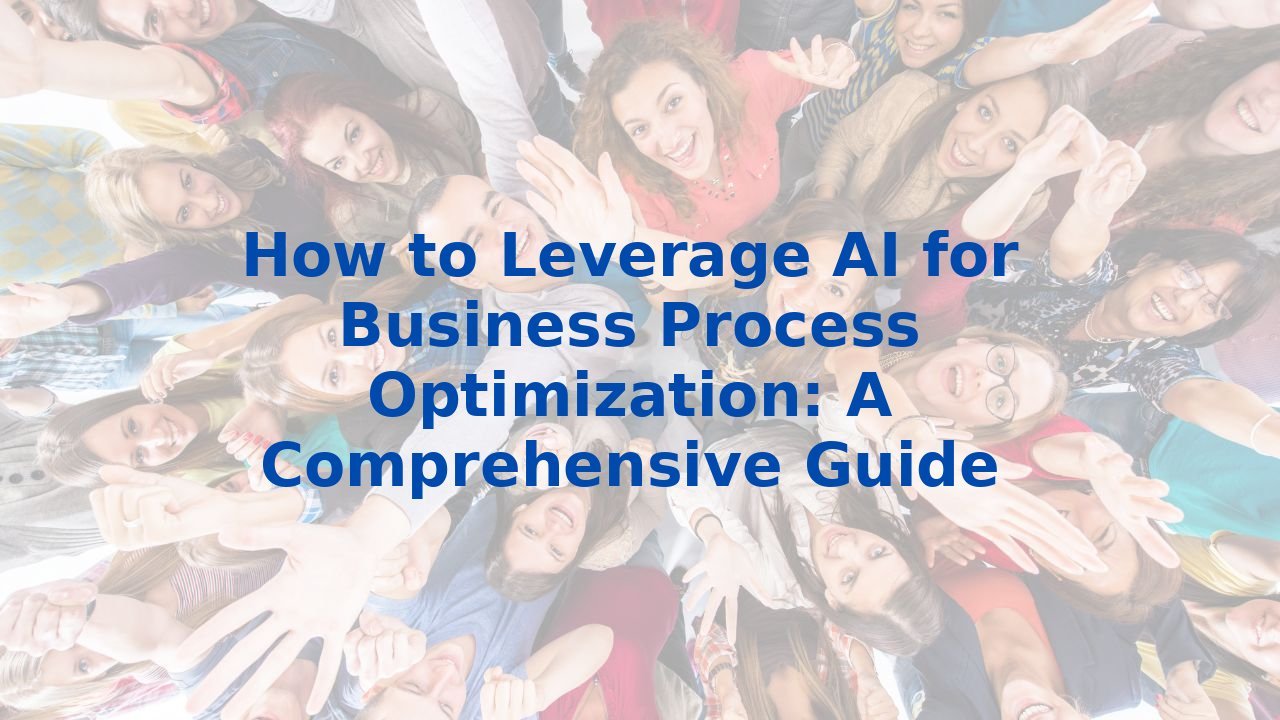How to Leverage AI for Business Process Optimization: A Comprehensive Guide
Enhancing Business Processes with AI: A Comprehensive Guide
Introduction
In an era where competition is fierce, and efficiency is paramount, businesses are increasingly turning to artificial intelligence (AI) as a catalyst for optimization. The reality is that traditional business processes can often bottleneck productivity, but by embracing AI, organizations can unlock a multitude of advantages that enhance operational efficiency, streamline decision-making, and improve overall performance.
What is AI Process Optimization?
AI process optimization is the strategic use of AI technologies and machine learning to refine business processes. By automating routine tasks, analyzing vast sets of data, and enhancing decision support systems, AI not only drives error reduction but also catalyzes productivity improvements across the organization.
Key Benefits of AI in Business Process Management
Understanding how AI can bolster various business functions is the first step towards harnessing its potential. Here are several key benefits:
1. Automation of Routine Tasks
AI excels at automating repetitive, high-volume tasks. Intelligent document processing (IDP) streamlines the workflow by converting documents into actionable data with minimal human intervention, freeing up valuable employee time for more strategic initiatives.
2. Enhanced Decision Making
By detecting patterns, predicting trends, and providing predictive analytics, AI empowers leaders to make data-driven decisions. For example, AI analyzes financial practices and improves lending decisions, saving crucial time without compromising accuracy.
3. Process Building and Optimization
AI can craft optimized processes based on historical data and user-specific parameters. By rapidly processing data points, AI delivers insights that encourage prompt and confident decision-making.
4. Real-Time Monitoring and Risk Detection
Through AI-driven process mining, organizations can engage in real-time monitoring, instantly identifying deviations and anomalies in workflows. This capability not only improves issue detection but also mitigates risks associated with operational failures.
5. Customer Service Optimization
By automating initial inquiries through AI-powered chatbots and analyzing consumer feedback, businesses can refine their customer support practices. Such enhancements lead to reduced response times and an overall improved customer experience.
6. Sales and Marketing Enhancement
AI plays a crucial role in dynamically evaluating customer behavior. By predicting which customers are more likely to generate revenue, organizations can streamline their sales strategies while automating administrative tasks, resulting in a more personalized approach that enhances engagement.
Practical Applications of AI in Business Processes
The applications of AI across different business functions are plentiful and transformative:
1. Supply Chain Management
AI analyzes real-time purchase data to identify unusual patterns, such as spikes in product demand. This capability ensures timely inventory restocking and avoids disruptions in supply chains.
2. HR Processes
In the realm of Human Resources, AI can enhance objectivity and streamline processes, from recruitment to employee retention. By aggregating critical data points, AI assists HR teams in making informed compensation decisions, creating an equitable hiring landscape.
3. Product Development
AI-driven generative design fosters innovation in product development. By analyzing input parameters, it promises design exploration that optimizes creativity while minimizing costs and time spent on prototyping.
4. Content Generation
For marketing and communications, AI tools offer efficient content generation. These systems can produce a vast array of text, such as product descriptions and marketing copy, thereby accelerating marketing efforts without sacrificing quality.
The Role of Employee Training in AI Implementation
While AI serves as a potent tool, its effectiveness is enhanced tremendously when paired with robust employee training. Invested staff who understand AI's capabilities can seamlessly integrate these technologies into their workflows. Here are a few benefits of equipping your workforce:
1. Understanding AI Capabilities
Training helps employees recognize what AI can achieve, fostering a culture of innovation where AI tools are utilized to their fullest potential.
2. Data Analysis Skills
Equipping staff with data analysis skills enables them to effectively leverage AI insights. Training programs that cover data visualization, pattern recognition, and predictive modeling create a base of informed decision-makers.
3. Automation and Process Mapping
Training employees in process automation and mapping allows them to use AI effectively, particularly in robotic process automation (RPA), enhancing productivity significantly.
4. Adaptability and Continuous Learning
With AI technologies continuously evolving, a commitment to training fosters adaptability, ensuring that employees stay ahead in a rapidly changing landscape.
Conclusion
The integration of AI into business processes is not merely a trend; it's a strategic necessity for organizations intent on optimal efficiency and sustainable growth. By automating mundane tasks, enhancing decision-making, and optimizing workflows, AI stands as a key player in the quest for operational excellence. However, to amplify its impact, empowering employees through targeted AI training unleashes the full potential of these cutting-edge technologies. Embrace this journey toward optimization, and your organization will not only survive but thrive in the competitive landscape.



